How Did They Do The Makeup For Davy Jones
The Monkees' Tragic Real-Life Story
For a band that was initially conceived as America's reply to the Beatles, in sitcom course, the Monkees really didn't practise too bad. John Lennon famously referred to them as the "Marx Brothers" in recognition of their one-act chops, and then he got to sit back and watch while the Marx Brothers of rock sold more albums than he did. And they didn't just sell more albums than he did; in 1967 they sold more albums than the Beatles and the Rolling Stones combined.
The Monkees not merely had legions of fans, they had legions of squealing fans, just like the Beatles did. They also had two Emmys and sold 50 million records. Despite their questionable origins, there was no doubt that what they had was exactly what music fans of the 1960s were looking for.
Still, as information technology is with so many rock bands earlier them and and so many rock bands since, the history of the Monkees is full of tragedy, poverty, alcoholism, and band members mostly not liking each other. Information technology's nothing new, really, but for a band that was known for beingness funny and upbeat, it might surprise some readers to hear that the story of the Monkees was not as funny and upbeat as the characters that audiences adored during those two fleeting Tv set seasons way back in the 1960s.
The Pre-Fab 4
In 1965, a couple television producers had an idea. Or more accurately, they were trying to cannibalize someone else's idea. The success of the Beatles movies A Hard 24-hour interval'south Night and Assist! inspired them to practice something similar with an American sitcom, and that's how the Monkees were born. The members didn't come together the way bands traditionally practise (in college, while drunk). Instead they auditioned and were selected, not especially for their musical talent but more for the things that work for Television set: charisma, proficient looks, and acting skills. Still, at least 2 of the band'south members — Michael Nesmith and Peter Tork — were accomplished musicians, and AllMusic Micky Dolenz and Davy Jones also had decent musical chops.
The show was conceived pretty much the same mode as any sitcom. The actors would play characters, which meant no one ever intended for the Monkees to write their own stuff. The music was to be strictly prerecorded, with the ring providing vocals only. After the band released their first unmarried and played a few shows, though, it became clear that they were more than merely actors, but the higher-ups remained in control anyway. And so the Monkees were never able to milkshake their less-than-iconic origin story and thus became adequately universally known equally the "Pre-Fab Iv." (In instance that ways nothing to you, it was a play on "prefabricated" and the Beatles' nickname, "the Fab Four.")
Hey hey, those other guys write all the Monkees' music
In January 1967, Peter Tork and Michael Nesmith kind of lost it when they listened to their second anthology (More of the Monkees), and discovered that it was nix but recycled music from the show. Co-ordinate to AllMusic, at that indicate the group finally decided to take a stand, enervating artistic command over their own material.
Fortunately, the Monkees were enough of a sensation at this point that the producers couldn't simply fire them and replace them with more agreeable performers. So they capitulated, fired the bear witness's music coordinator, and the Monkees finally became the "real" band that critics had for so long accused them of not existence.
The problem, though, was that creative freedom also meant freedom to disagree, and the band'due south autonomy also ended upwards showcasing their creative differences. Their third and fourth albums were both commercial and artistic successes, but the fifth (The Birds, the Bees & the Monkees) was starting to feel a piffling disjointed. And it was around that time, too, that the television serial was canceled — the band wasn't happy with the sitcom format and thought it should exist more of a diversity show, and the network in turn decided peradventure it would be amend to just ax the whole matter. That was mostly okay, though, because the band was already working on their first movie. So it would all work out when the band became moving picture stars. Hopefully.
I know, allow's make ourselves relevant by alienating all our fans
Success in music depends a lot on the preferences of your audition, but success in movies depends on other factors, like screenwriting, plot, and not being so weird that the kids who make upwards nearly of your fan base walk abroad from the theater wondering why they ever idea you were cool.
The Monkees 1968 feature film, Head, failed on pretty much all of those points. According to Nighttime Flight, the screenplay was written by Jack Nicholson, simply even that didn't do much to recommend it because in those days Jack Nicholson was a B-movie histrion no one had ever heard of.
The ring basically brainstormed the flick while high at a party, and so Nicholson strung the ideas together into a screenplay while he was tripping on LSD. And then the finished film was a weird, plotless, disjointed commentary on everything from consumerism to media deception to police brutality to the exploitation of tragedy. Information technology was also a self-deprecating jab at the Monkees themselves, and their neat and tidy manufactured image. Unfortunately, information technology was poorly advertised, audiences that did see information technology were confused, and information technology was a big ol' bomb.
Head is now a cult favorite and is by and large well-liked by modern critics, but in those days it was pretty much both the beginning and the cease of the Monkees' film career.
All expert things must fizzle out similar a warm soda
Caput's abysmal box office performance disappointed everyone, but Peter Tork seemed specially deflated by the experience. In a 2011 interview with the Guardian, he said, "The movie dropped like a brawl of dark star. The simile of a rock in the h2o is too mild for how badly that movie did." The weekend afterward Head'south west coast premiere, the ring got together to piece of work on a television special called "33 ⅓ Revolutions Per Monkee," and later that Tork left the band. The iii remaining members stuck information technology out for some other couple albums simply failed to generate any new hits, and so at that signal it really did seem like the band had stagnated.
According to AllMusic, toward the finish of 1969, Nesmith chosen it quits, too. He'd already released a solo album and obviously saw more than of a time to come alone. Jones and Dolenz recorded a final album, but the two-human being version of the Monkees was conspicuously merely a ghost of what the ring had once been, and by 1970 it was pretty obvious where the Monkees were headed, which was nowhere. The band officially broke upwards after that last album, and that was that, the Monkees ended not with a bang but with a fizzle. For the time beingness, anyway.
Peter Tork hits rock lesser
Things did not become awesomely for the onetime Monkees after the dissolution of their group, especially for Peter Tork. Tork went on to form a band chosen Release, which ironically dissolved before it was able to ... release ... a single tape. He also attempted to start a production visitor, but No Treble says that enterprise also went nowhere.
Tork connected to struggle throughout most of the 1970s. His money ran out, he was forced to rent his abode to a friend in gild to avoid foreclosure, and he ended up moving into David Crosby's basement (that's David Crosby of Crosby, Stills, and Nash) with his significant girlfriend. And then because things were not already dismal plenty, he was arrested for possession of hashish and had to spend three months in an Oklahoma penitentiary.
Afterwards that, Tork sort of moved away from the music industry altogether and took a job teaching loftier schoolhouse math and music and coaching baseball game. Simply ultimately, he had difficulty with the structure of the school system and concluded upwardly getting fired. And he had a drinking problem that persisted into the early 1980s, so that almost certainly contributed to his lack of professional success.
Fortunately, Tork was able to turn things around when he quit drinking in the early on '80s. He stopped taking drugs non long later that and was finally able to revitalize his music career. Simply information technology was a pretty long, difficult road to get there.
Michael Nesmith hits rock bottom
Nada is scarier than the IRS, except possibly sharks. And talking baby dolls. Almost of united states of america go out of our way to make sure nosotros never, ever accept to deal with the IRS autonomously from sending them that once-annual envelope postmarked April xv because not doing that is either crazy or a full denial of reality. We're non really certain which of those things Michael Nesmith was, but in his 2017 memoir he wrote that the dissolution of the Monkees was followed almost immediately by the descent of the IRS. "[They] showed upward with a huge beak for unpaid taxes and started seizing property," he wrote. So after his whirlwind rise to fame, he was pretty much left with nothing to show for it.
But that'due south not the only bad affair that happened. Later the IRS took all his stuff, his marriage complanate, and he dealt with the emotional blow in the most toxic way possible — past having an matter with the wife of a friend. In his memoir he lamented that he was basically at a career and personal stone bottom: "I had no opportunities equally an thespian, a player, a singer, a songwriter, or a producer."
So that's pretty sad and tragic, and you might be tempted to experience sorry for the guy until y'all remember that he was also the heir to the Liquid Newspaper fortune, and he literally invented MTV. So things worked out okay for him in the stop.
Dolenz heads for rock lesser, just hits a ledge somewhere in the eye
Micky Dolenz also spent a lot of years doing not very much of annihilation. For a while, his resume'due south main selling point was non his success as an thespian (which pre-dated the Monkees by nearly a decade) or his vocal talents, it was the fact that he was that kid from the Monkees. That notoriety earned him some small boob tube roles and a few voice acting credits on super-cool, now-retro cartoons like Scooby Doo and Captain Caveman. At one time he was neck and neck with Henry Winkler for the role of the Fonz on the iconic 1970s sitcom Happy Days, but that opportunity as well passed him past. "I remember when Henry first walked into the interview," he told Guitar World. "He saw me and said, 'Oh crap, Micky Dolenz is hither. I'll never get information technology.' But I'm so glad he did because he was a much improve Fonz than I would take been."
Dissimilar his fellow simians, though, Dolenz didn't flounder for long. By 1976 he was headed to the U.K. to star in a musical, and plans to stay for three months eventually morphed into a 12-yr career as a director and producer. So of all the old Monkees, Dolenz'south trajectory was not and so tragic, at least not from about 1976 on.
And then they got dorsum together ... again
By the power of MTV and with assistance from others in their orbit, iii of the Monkees (Dolenz, Jones, and Tork) got together for a 20th ceremony reunion tour in 1986 that exploded into an unexpectedly huge hitting, pop with critics and audiences. By the 1990s, the former Monkees were all off doing their ain things, only the 30th anniversary was approaching and of course no ane in Hollywood/the music manufacture tin can allow an anniversary go by without making a huge fuss and re-releasing everything in the name of "delight can you give us more than of your money." Anyhow, according to AllMusic, the ring got together to talk well-nigh the impending anniversary, discovered they nevertheless had some musical chemistry, and went ahead and recorded another album. The 1996 anthology Justus became the commencement Monkees tape written and produced entirely by Nesmith, Tork, Jones, and Dolenz.
That was crawly, until they decided to beginning touring again. That, plainly, is when all of their artistic differences and personal senses of non liking one some other started to resurface. Nesmith dropped out of the tour early on, and the remaining ring members weren't exactly tight-lipped nigh how that made them feel. And because they hadn't withal learned anything, the remaining three toured again in 2001, simply this fourth dimension it was Tork who abased ship, although Jones and Dolenz said they'd fired him. Tork later complained that Jones and Dolenz drank so much on the tour that they became "mean and abusive." Simply it wasn't merely Tork clashing with Jones and Dolenz — evidently Jones and Dolenz weren't getting along swimmingly, either. In a 2009 interview, Jones said he "couldn't imagine sharing a phase with Micky Dolenz" ever again. Ouch.
And Michael Nesmith came down with some baroque mystery illness
Meanwhile, things weren't going awesomely for Michael Nesmith, either. In 2010, Nesmith'due south married woman left him, and in the middle of all of that emotional turmoil, he started to go blind.
"I lost my sight to cataracts," he wrote in his 2017 memoir Infinite Tuesday: An Autobiographical Riff, "and at the same time lost my flexibility to an undiagnosed status that bedridden me, making information technology difficult and painful to walk. I was substantially helpless, a captive in my home."
Fortunately, Nesmith's blindness was reversible — cataract surgery restored his sight, but his strange, crippling illness was more difficult to overcome because no one knew what information technology was. The illness left him largely unable to use his left paw, and his right pes was useless enough that he had to drag it when he walked. And to make matters worse, the specialists he visited generally but scratched their heads and offered him hurting medication.
The skillful news is that the illness, whatever it was, eventually went abroad on its ain. Nesmith, a Christian Scientist, believes prayer and meditation cured him. Which is cool, merely so his memoir goes on to talk about his friend who threw abroad his chemotherapy drugs and spontaneously recovered from cancer, and that's the sort of batpoop crazy stuff that we simply tin't get backside. But for mystery illnesses with no known treatment, yay Christian Science.
The death of Davy Jones finally dissolves the ring
And so, because toxic relationships take a habit of never ever ending no thing how badly you want them to, the Monkees got together once again in 2011 and went on tour once again, only without Michael Nesmith who past then had inherited the Liquid Newspaper fortune and apparently didn't actually need to tour anymore.
The 45th anniversary bout really went shockingly okay for rockers clearly past their prime, although after a summer of traveling around North America the band members, who were all well into their 60s at that point, decided that plenty was enough and chose non to add more dates to the tour. Information technology was just as well because in February of the following yr Davy Jones died of a heart attack.
Jones' expiry shocked everyone who knew him. "He was a vegetarian, and there was not an ounce of fat on the guy," a business associate told CNN. "He lived on the beach in Florida and ran miles every forenoon. ... He couldn't have been in better shape." So that, finally, was the end of the Monkees, at to the lowest degree every bit a foursome.
There was a bright side to the loss, though, or should we say a not-every bit-dark-as-everything-else side — Michael Nesmith joined the remaining ii Monkees for a short set up of reunion performances, each of which featured a tribute to their fallen bandmate.
And then Peter Tork followed Davy Jones
In February 2019, the Monkees received their most contempo blow — Peter Tork had finally succumbed to the rare form of head and cervix cancer he'd been contesting for a decade.
Tork was kickoff diagnosed with adenoid cystic carcinoma two years earlier the band'southward 45-twelvemonth reunion tour. In 2011 he told Rolling Stone that the surgery he'd undergone to remove the cancer had been a success. "My checkups accept been articulate ever since," he wrote. "I'm excruciatingly lucky. I count my blessings every day."
Sadly, cancer is 1 of those illnesses that doctors will always hesitate to say is "cured," and for good reason. Information technology can come back even years after it's disappeared, and when information technology does, it's often resistant to the treatments that took information technology downwardly the first time. Subsequently Tork's death, the two remaining Monkees posted heartfelt messages in their bandmate's honor, but Nesmith's was especially profound: "My eye is broken," he wrote. "Even though I am clinging to the thought that we all continue, the hurting that attends these passings has no cure. It'south going to be a rough day. I share with all Monkees fans this alter, this 'loss,' fifty-fifty and so. PT will exist a part of me forever."
Source: https://www.grunge.com/146463/the-monkees-tragic-real-life-story/
Posted by: govanloded1954.blogspot.com

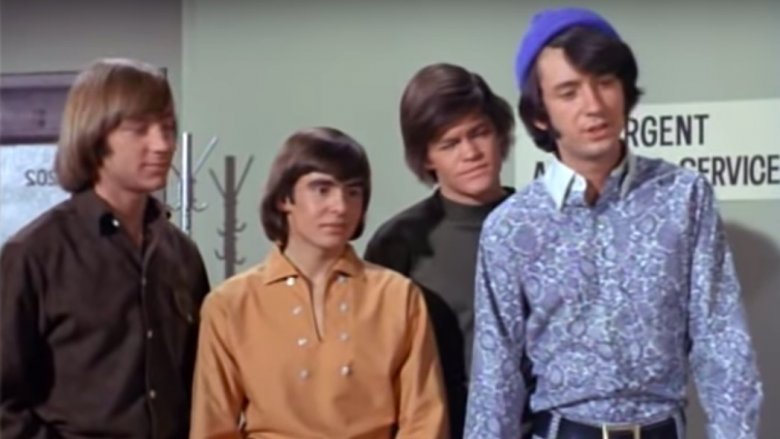
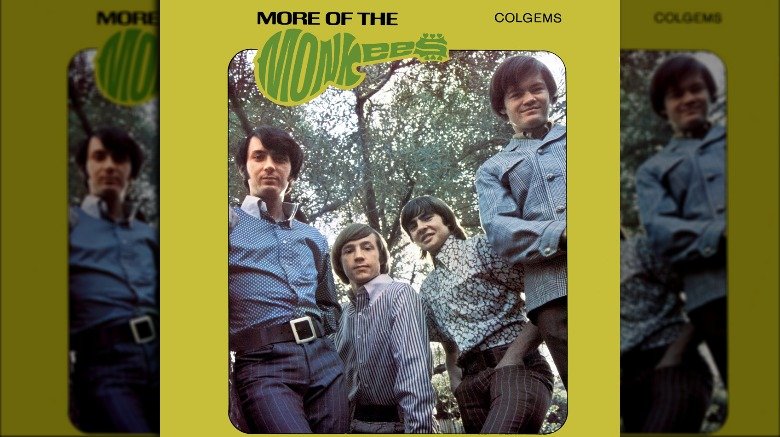
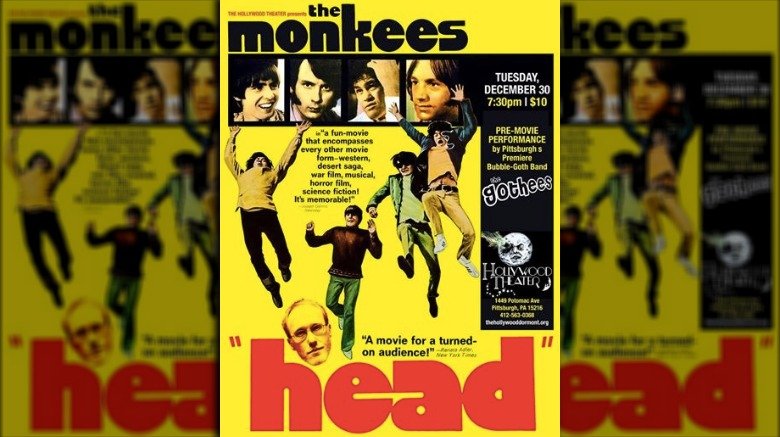
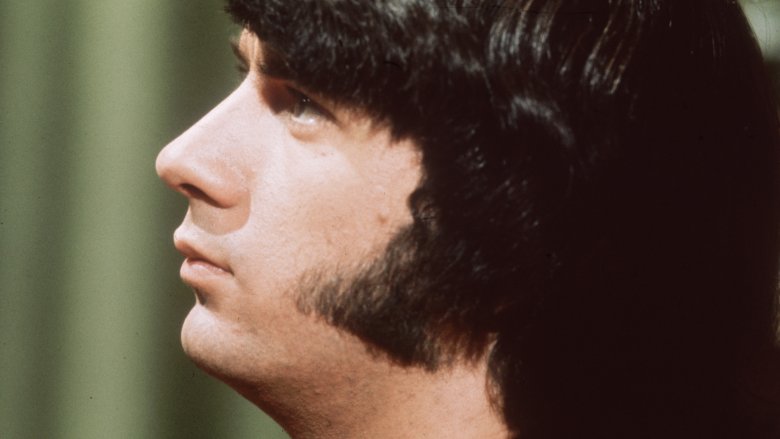
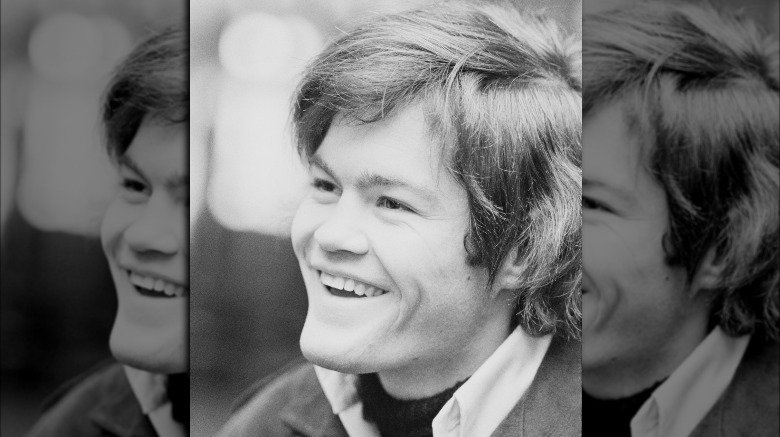
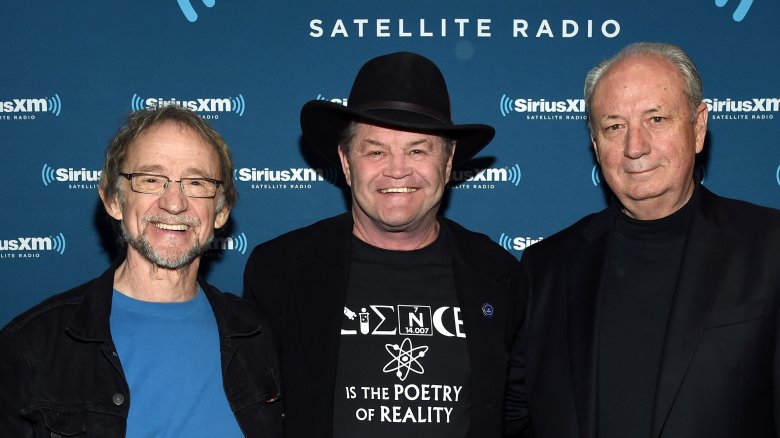
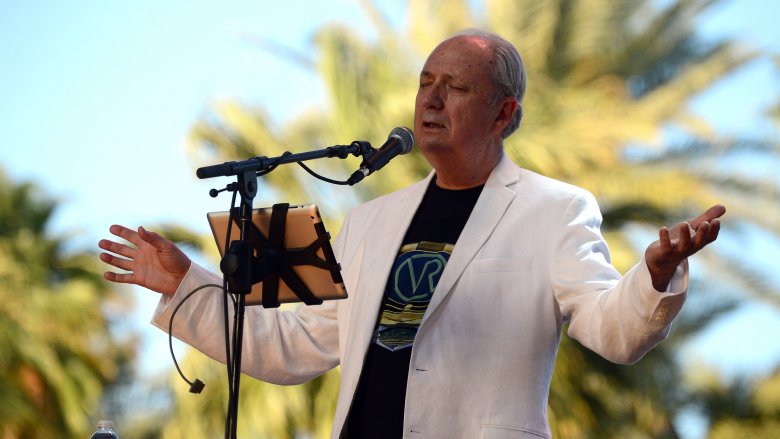
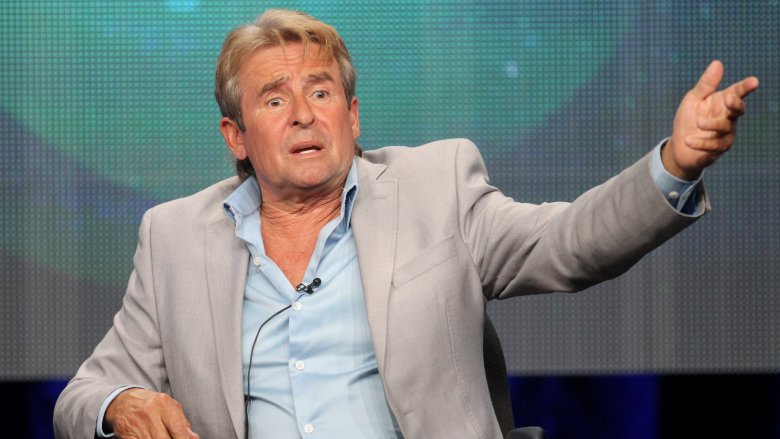
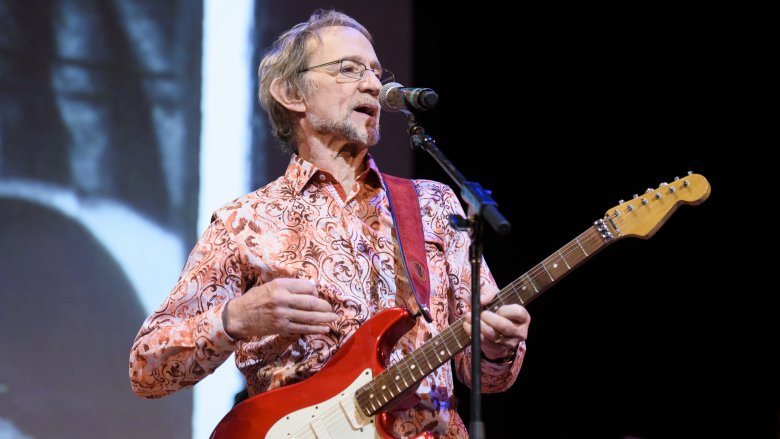
0 Response to "How Did They Do The Makeup For Davy Jones"
Post a Comment